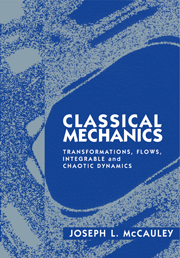Book contents
- Frontmatter
- Contents
- Foreword
- Acknowledgements
- 1 Universal laws of nature
- 2 Lagrange's and Hamilton's equations
- 3 Flows in phase space
- 4 Motion in a central potential
- 5 Small oscillations about equilibria
- 6 Integrable and chaotic oscillations
- 7 Parameter-dependent transformations
- 8 Linear transformations, rotations, and rotating frames
- 9 Rigid body motions
- 10 Lagrangian dynamics and transformations in configuration space
- 11 Relativity, geometry, and gravity
- 12 Generalized vs nonholonomic coordinates
- 13 Noncanonical flows
- 14 Damped-driven Newtonian systems
- 15 Hamiltonian dynamics and transformations in phase space
- 16 Integrable canonical flows
- 17 Nonintegrable canonical flows
- 18 Simulations, complexity, and laws of nature
- Bibliography
- Index
18 - Simulations, complexity, and laws of nature
Published online by Cambridge University Press: 05 June 2012
- Frontmatter
- Contents
- Foreword
- Acknowledgements
- 1 Universal laws of nature
- 2 Lagrange's and Hamilton's equations
- 3 Flows in phase space
- 4 Motion in a central potential
- 5 Small oscillations about equilibria
- 6 Integrable and chaotic oscillations
- 7 Parameter-dependent transformations
- 8 Linear transformations, rotations, and rotating frames
- 9 Rigid body motions
- 10 Lagrangian dynamics and transformations in configuration space
- 11 Relativity, geometry, and gravity
- 12 Generalized vs nonholonomic coordinates
- 13 Noncanonical flows
- 14 Damped-driven Newtonian systems
- 15 Hamiltonian dynamics and transformations in phase space
- 16 Integrable canonical flows
- 17 Nonintegrable canonical flows
- 18 Simulations, complexity, and laws of nature
- Bibliography
- Index
Summary
Integrability, chaos, and complexity
Phase space flows divide into two basic classes: completely integrable and ‘nonintegrable’ (incompletely integrable). In the first case the motion is equivalent to a single time-translation for all finite times (chapter 3). In the second case singularities of the conservation laws prevent this degree of simplicity (section 13.2).
Nonintegrable systems can be divided further into two classes: those that are in principle predictable for all times, and those that are not. The first class includes deterministic dynamics where there is a generating partition. An example, the asymmetric tent map, was given in chapter 14. A chaotic dynamical system generates infinitely many different statistical distributions through the variation of classes of initial conditions. Only the differentiable distribution (corresponding to the invariant density) is generated by initial data that occur with measure one. The fragmented statistical distributions, including multifractal ones, occur for the measure zero set of initial conditions.
Whenever a dynamical system is computable (McCauley, 1993), which is the only case that can be used computationally and empirically, then the measure zero initial conditions are of dominant importance. There is, as yet, no known case in nature where the differentiable probability distribution describes the experiments or observations performed on a driven-dissipative chaotic dynamical system. The generating partition forms the support of every probability distribution that occurs mathematically, and can be discovered (when it exists) through backward iteration of the Poincaré map.
- Type
- Chapter
- Information
- Classical MechanicsTransformations, Flows, Integrable and Chaotic Dynamics, pp. 441 - 452Publisher: Cambridge University PressPrint publication year: 1997



